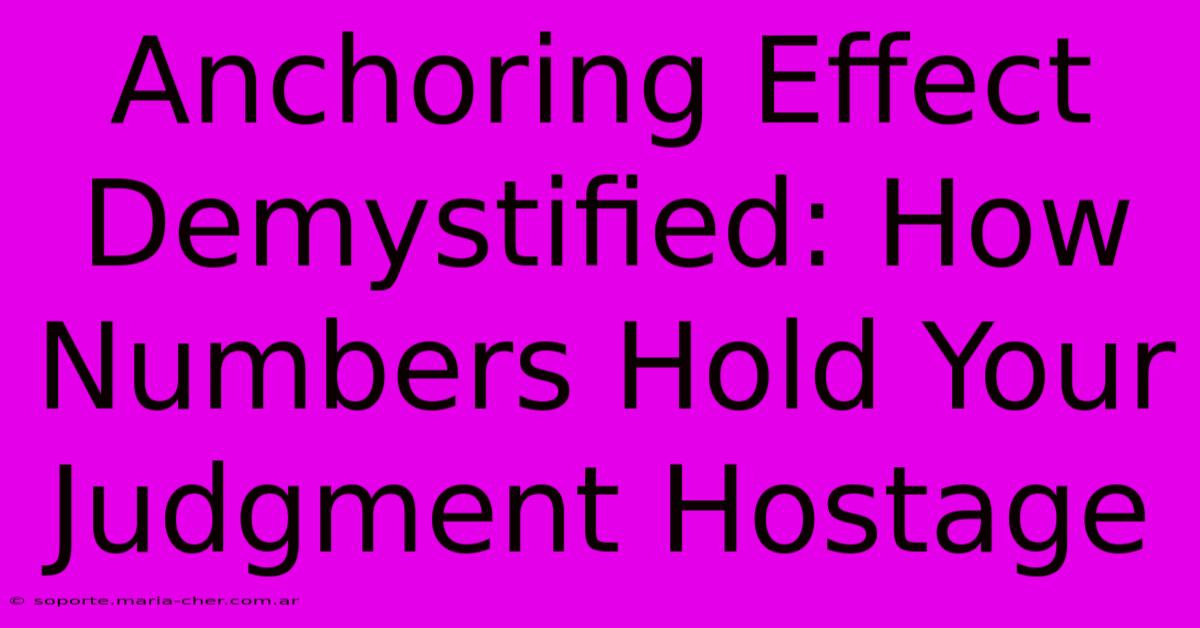Anchoring Effect Demystified: How Numbers Hold Your Judgment Hostage

Table of Contents
Anchoring Effect Demystified: How Numbers Hold Your Judgment Hostage
The human mind, while a marvel of complexity, isn't always the most rational decision-maker. We're susceptible to cognitive biases, mental shortcuts that can lead us astray. One of the most pervasive and powerful of these is the anchoring effect. Understanding this effect is crucial for making better, more objective decisions in all aspects of life, from negotiating a salary to choosing a product.
What is the Anchoring Effect?
The anchoring effect is a cognitive bias where an initial piece of information, the "anchor," disproportionately influences subsequent judgments, even if that initial information is completely arbitrary. Essentially, your brain latches onto this anchor and uses it as a reference point, even if it's irrelevant to the decision at hand. This leads to estimates and decisions that are biased towards that initial anchor.
Think of it like a ship's anchor: once dropped, it holds the ship in place, making it difficult to move, regardless of the currents or winds. Similarly, an anchor in decision-making holds your judgment in place, making it resistant to change.
Examples of Anchoring Bias in Action:
-
Negotiating a Salary: A prospective employer suggests a starting salary of $60,000. Even if you know your skills warrant $70,000, the initial anchor of $60,000 will influence your counteroffer, potentially making you settle for less than you deserve.
-
Pricing Strategies: Retailers often use anchoring to their advantage. They might list an inflated "original price" next to a discounted price. The high original price serves as the anchor, making the discounted price seem like a better deal than it actually is.
-
Real Estate: The first house you see on a home tour can become an anchor for your judgment. Subsequent houses might seem more or less desirable simply by comparison to that initial anchor.
How Does the Anchoring Effect Work?
The exact mechanisms behind the anchoring effect are still being researched, but several theories exist:
-
Insufficient Adjustment: We often start with the anchor and then adjust our estimate from there. However, we frequently don't adjust enough, leaving our judgment skewed towards the anchor.
-
Selective Accessibility: The anchor activates related information in our memory, making it more accessible and influencing our judgment.
-
Priming: The anchor primes us to think in a certain way, influencing the way we process subsequent information.
How to Avoid the Anchoring Effect:
While completely eliminating the anchoring effect is impossible, you can significantly mitigate its impact:
-
Be Aware of Anchors: Consciously recognize when an anchor is being presented, whether in a negotiation, advertisement, or other situation.
-
Consider Multiple Perspectives: Actively seek out diverse information and perspectives before making a decision. Don't rely solely on the initial information presented.
-
Use Objective Measures: Whenever possible, rely on objective data and facts rather than gut feelings or initial impressions. Consider using independent sources for pricing and other information.
-
Focus on the Actual Value: Shift your focus away from the anchor and concentrate on the inherent value of the item or offer.
-
Generate your own anchor: Before entering a negotiation, conduct thorough research to determine a fair value and use that as your anchor.
Conclusion:
The anchoring effect is a powerful cognitive bias that can significantly impact our decisions. By understanding how it works and employing strategies to mitigate its influence, you can make more rational, objective choices and avoid being held hostage by seemingly irrelevant numbers. Learning to recognize and resist the anchoring effect is a vital step towards improved decision-making in all aspects of life. By actively challenging initial impressions and seeking out alternative viewpoints, you can gain a more accurate understanding of the situation and make more informed choices.

Thank you for visiting our website wich cover about Anchoring Effect Demystified: How Numbers Hold Your Judgment Hostage. We hope the information provided has been useful to you. Feel free to contact us if you have any questions or need further assistance. See you next time and dont miss to bookmark.
Featured Posts
-
Decisions Unraveled The Surprising Role Of Initial Figures
Feb 12, 2025
-
Anchoring Bias Unlocking The Cognitive Trap That Influences Your Choices
Feb 12, 2025
-
The Cognitive Illusion Why We Re Slaves To Early Estimates
Feb 12, 2025
-
Anchoring Effect Demystified How Numbers Hold Your Judgment Hostage
Feb 12, 2025
-
The Illusion Of Information How Numbers Limit Your Decision Making Horizons
Feb 12, 2025
